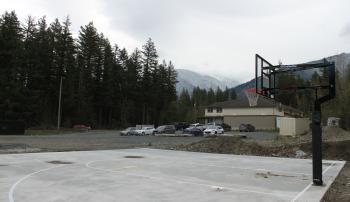Image Caption
Summary
Local Journalism Initiative Reporter
Windspeaker.com
First Nations in British Columbia are the recipients of new basketball courts thanks to a partnership which includes the Vancouver Bandits, a pro franchise that competes in the Canadian Elite Basketball League.
Details for the new initiative, called Court Projects, were announced on Oct. 27.
The venture is an extension of a previous collaboration between the Bandits, the Indigenous Sport, Physical Activity And Recreation Council (I-SPARC), which is the governing body of Indigenous athletics and recreation in the province., and FortisBC, a natural gas and utility company in the province.
These partners have provided the Indigenous Basketball Collective Camp in Langley, B.C. over the past two summers. The collective aims to create opportunities, primarily for Indigenous basketball players and coaches, to take part in competitions, workshops and training camps.
As part of the collective, the Bandits’ coaching staff provided coaching sessions for about 50 Indigenous youth in 2022, and again this past summer.
As for Court Projects, it is also supported by B.C.’s Ministry of Tourism, Arts, Culture and Sport.
So far three First Nations have had outdoor courts, including hoops and backboards, constructed and a fourth is underway.
Full-sized courts have been built in Snuneymuxw First Nation and in Shxwhá:y Village. A half court has been constructed in Soowahlie First Nation. The fourth court is under development in Sumas First Nation.
“This is a great opportunity to build capacity in communities,” said I-SPARC’s CEO Rick Brant.
Brant is pleased to see a pro franchise in the province assisting in grassroots programs.
“It’s an extension of our existing partnership with the Bandits,” he said of the Court Projects. “They’re a great group of individuals to work with.”
The courts will “springboard some of the community programming we can offer,” Brant said, and he’s hoping numerous other courts will be built in First Nations across the province in future years via the program.
“I think it’s a matter of ‘think big and start small’,” he said.
Doug Slater, who is the vice-president of Indigenous relations and regulatory affairs for FortisBC, said there’s a simple reason why his company is involved in Court Projects.
“We’re an organization committed to reconciliation,” he said.
Slater said FortisBC has its infrastructure spread out across 150 territorial lands in the province and it services 58 Indigenous communities.
Slater said Court Projects is a worthwhile venture.
“It’s to recognize the importance of Indigenous youth,” he said. “It’s also about providing them a safe place to play.”
Representatives from the four communities involved with Court Projects speak highly of the venture.
“This partnership symbolizes coming together to show support and recognition of each other's
cultures,” said Shxwhá:y Village Chief Robert Gladstone. “Showing this to children and instilling it in them, it gives them strength going forward. It is much more than the game of basketball. It is the evolution of growth and working with cultures and people in other areas. It is a beautiful thing to be part of.”
Soowahlie First Nation Chief Brenda Wallace is pleased to see a pro squad involved.
“I can’t say enough about the Vancouver Bandits,” she said.
Wallace has already witnessed many local youth playing on the new court.
“When I see and hear the kids playing on the new outdoor court it is a positive reminder of the partnership and our great work together,” she added.
William Yoachim, a Snuneymuxw First Nation councillor, also praised the Bandits for assisting the community and the respect they have shown.
“The donation of a basketball half-court is a great example of that respect and will provide an
opportunity for our youth to enjoy the game at home in our community,” he said.
Sumas First Nation Chief Dalton Silver is confident the soon-to-be-completed court in his community will be well received.
“Supporting the development of Indigenous athletes is one way our government is working to advance true and lasting reconciliation with Indigenous peoples,” he said.
Windspeaker is owned and operated by the Aboriginal Multi-Media Society of Alberta, an independent, not-for-profit communications organization.
Each year, Windspeaker.com publishes hundreds of free articles focused on Indigenous peoples, their issues and concerns, and the work they are undertaking to build a better future.
If you support objective, mature and balanced coverage of news relevant to Indigenous peoples, please consider supporting our work. Whatever the amount, it helps keep us going.

